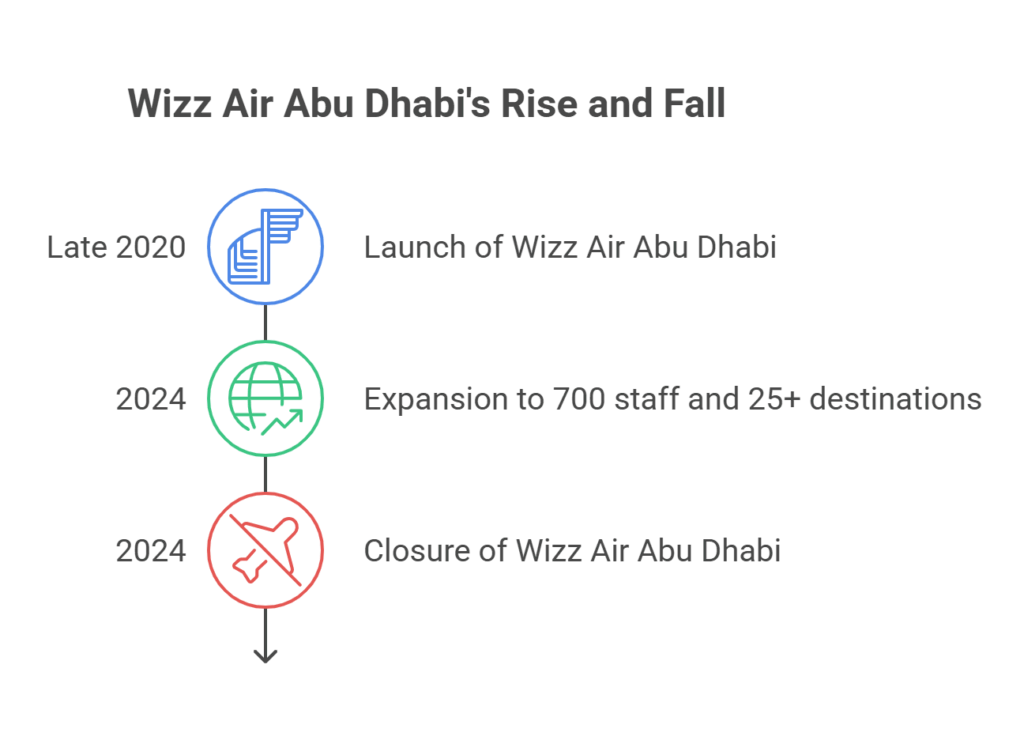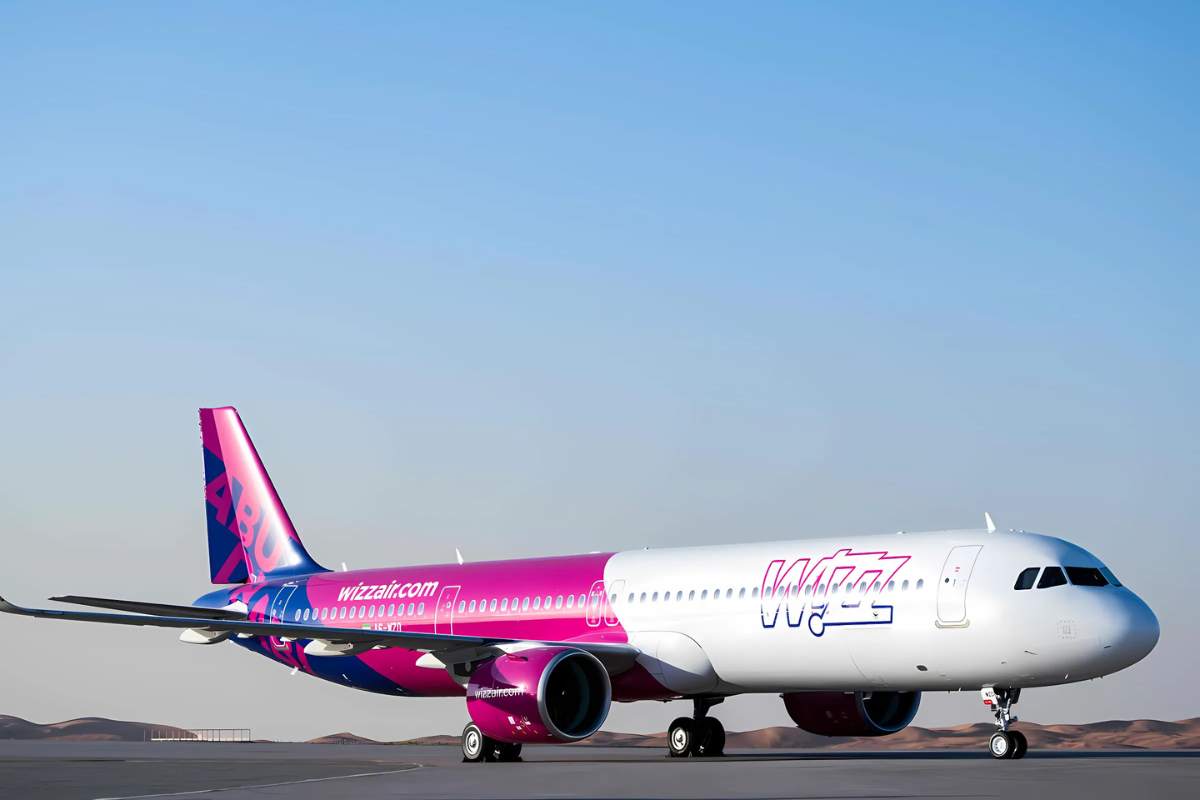Believe it or not, a surprising airline shake-up just landed. In a move that’s raised more than a few eyebrows in aviation circles, Wizz Air, the bright-pink Hungarian low-cost carrier, has announced it will cease all flights from Abu Dhabi starting September 1, 2025. Yep, after years of ambitious growth in the Gulf, it’s pulling the plug.
Why? Three words: engines, geopolitics, and red tape.
This isn’t just a routine route cancellation or a seasonal shuffle. Wizz is making a full-on strategic pivot, pressing pause on its Middle Eastern ambitions and heading straight back to its European comfort zone. And for travelers, employees, and even its local partners, this news is… well, let’s just say it’s a big deal.
So, what exactly happened here? And what does this mean if you’ve already booked that dirt-cheap flight to Central Asia or the Caucasus? Let’s dive in.
A Sudden Goodbye: What Wizz Air Just Announced
On a quiet Monday, the airline made it official: operations from Abu Dhabi are wrapping up by the end of August. Starting September 1, no more Wizz flights will be taking off from the UAE capital. For anyone holding tickets beyond that date? Automatic cancellations are coming.
Why the dramatic exit? According to the airline, three main factors made the Abu Dhabi venture unsustainable:
- The blazing Gulf heat has been a nightmare for their fleet’s engines.
- Geopolitical instability in the region kept shutting down airspace unexpectedly.
- Regulatory hurdles limited expansion into key markets like India and Pakistan.
Now, none of this came completely out of the blue. Over the past year or so, there were murmurs. Route reductions. Hints from the CEO. Temporary suspensions due to airspace issues. But still, this full exit? It caught many off guard.
Heat + Engines = Trouble in the Skies

Let’s start with the weather, something we all love to complain about, but in aviation, it’s serious business.
In regions like the Gulf, where summer temperatures soar past 45°C (that’s 113°F), engines take a beating. Wizz Air’s Airbus A321neo aircraft, powered by Pratt & Whitney engines, started showing signs of wear and tear much faster than expected. The harsh desert climate was pushing those engines harder than they were designed for, leading to more frequent repairs and less flying time.
And if you know anything about budget airlines, it’s this: idle planes equal lost profits. Low-cost carriers like Wizz depend on lightning-fast turnaround times, tight schedules, and aircraft that stay in the sky as much as humanly possible. A grounded plane isn’t just a logistical hiccup; it’s a financial sinkhole. And the Abu Dhabi heat made that sinkhole grow bigger with every passing month.
The airline tried adjusting. Pulling back on flight frequency. Shifting some routes around. But in the end, the math just didn’t add up.
Politics in the Air: When Routes Become Risks
Of course, it wasn’t just the climate.
The skies over the Middle East can be… unpredictable. Political tensions, conflicts, and even missile strikes have led to sudden airspace closures. One week, everything’s smooth sailing. The next? Flights grounded, detours mandated, passengers left scrambling.
And for a relatively small player like Abu Dhabi, without the massive operational buffers of giants like Emirates or Etihad, every disruption hit harder. When flights are delayed or rerouted, costs spike, and customer trust takes a nosedive. Even worse? Those closures were happening frequently enough that it started to feel like a gamble every time a plane took off. That’s not a great look for a carrier that markets itself on affordable, reliable travel. Eventually, Wizz Air had to admit: the geopolitical risk just wasn’t worth it.
The Bureaucratic Brick Wall
Then there’s the red tape.
When Wizz Air launched its Abu Dhabi venture, it had big dreams, especially about expanding into South Asia. Think India, Pakistan, Bangladesh, all massive markets with booming populations and huge demand for budget travel.
But those dreams hit a wall.
Despite months (even years) of negotiation, Wizz Air couldn’t secure enough landing rights or air traffic approvals to fully break into those routes. Slot constraints at key airports, complex bilateral agreements, and a tangle of regulations meant that Wizz Air Abu Dhabi was locked out of some of the most lucrative destinations it had hoped to serve.
In short, the doors never opened wide enough. And without access to those markets, the business case for staying in Abu Dhabi got weaker by the day.
A Promising Start, A Quiet Sunset
When Wizz Air Abu Dhabi first launched in late 2020, expectations were sky-high.

It was a 51/49 joint venture with Abu Dhabi’s state-backed investment arm, a sign that the airline had strong local support and deep pockets behind it. The plan? Start with a couple of aircraft, then scale aggressively. Up to 50 planes, maybe even 100 down the line. A full-fledged Gulf low-cost powerhouse. And for a while, it looked like they were on track.
By 2024, Wizz Air Abu Dhabi had grown to around 700 staff, pilots, crew, and operations, and was flying to 25+ destinations across Central Asia, the Caucasus, and Eastern Europe. Many of these were underserved routes that only Wizz dared to fly: think Tashkent, Kutaisi, and Astana.
The airline even splashed “Abu Dhabi” on the fuselages, a proud marker of its local roots. But behind the scenes, the cracks were forming. Maintenance costs kept climbing. Political turbulence refused to settle. Promised access to new markets never came. The dream started to fade.
And now, just five years in, it’s over.
What Happens to the Staff?
Here’s where things get personal.
Roughly 700 employees, many of them seconded from Europe, others hired locally, now face uncertainty. Wizz says it plans to reassign as many of them as possible to other bases, primarily in Central and Eastern Europe.
But make no mistake: this is a major upheaval. Relocation, re-training, even the emotional toll of leaving a base behind, these things take time. While some may land softly in other parts of Wizz’s network, others will face tougher transitions.
And What About Passengers?
If you’ve got a Wizz Air Abu Dhabi ticket booked for travel before August 31, you’re in luck. Your flight should still operate as planned. But for flights on or after September 1? Those are getting the axe.
Here’s what you need to know:
- Booked directly with Wizz? They’ll contact you with refund options or alternative routes.
- Booked through a travel agent or third-party site? Reach out to them ASAP to manage your booking.
- Looking for alternatives? Now’s the time. Summer travel is busy, and seats are filling up fast. Check other carriers flying similar routes from Abu Dhabi or nearby Dubai.
Pro tip: save all your communication with the airline or agent. If anything goes sideways during the refund process, a paper trail can save you hours of hassle.
Back to Europe: The Strategic Pivot
So… where does Wizz go from here?
Back home.
The airline has made it crystal clear: Europe is its heart, its home, and its highest priority. Around two-thirds of its operations and profits come from Central and Eastern Europe. Markets like Poland, Hungary, Romania, and the UK are booming for Wizz, and the plan now is to double down on those high-performing routes.
The aircraft from Abu Dhabi, a mix of A321s, will be redeployed to European bases where they can fly more routes, make more money, and dodge extreme heat and geopolitical drama. There’s even talk that the airline might scale back its long-haul ambitions altogether. A few years ago, Wizz was eyeing ultra-long-range A321XLRs to fly non-stop from Europe to places like India. But now? Those plans might be going cold.
Why chase new frontiers when your home turf is thriving?
For Abu Dhabi, A Setback, But Not a Stop
Of course, Wizz Air’s exit doesn’t mean the end of budget flying in the UAE.
Etihad is expanding. Air Arabia continues to grow. And newer players like flydubai and flynas are carving out space in the low-cost segment. Abu Dhabi’s government will likely regroup, reevaluate, and maybe find a new partner to revive its ambitions of becoming a budget hub. This might just be a temporary pause. The infrastructure is there. The market potential is real. It just needs the right model, and maybe some cooler weather.
The Bottom Line: Tough Call, Smart Move?
At the end of the day, Wizz Air made a painful but pragmatic decision.
Operating in Abu Dhabi just didn’t make business sense anymore. The climate was tough on hardware. The politics were tough on planning. And the regulations were tough on growth.
Sure, passengers will miss the cheap fares and exotic destinations. Employees will feel the pinch. And Abu Dhabi’s broader aviation goals might take a temporary hit.
But Wizz? They’re regrouping. Refocusing. Betting on what they know best.And if history is any guide, they’ll bounce back stronger, not with sand in their engines, but with solid footing on their European runways.






















